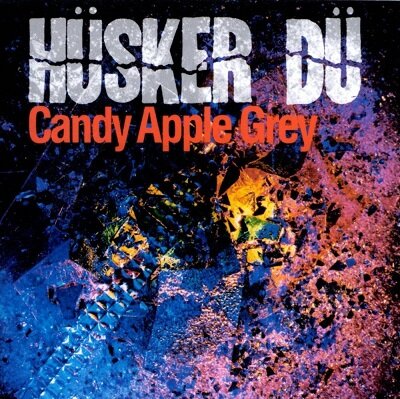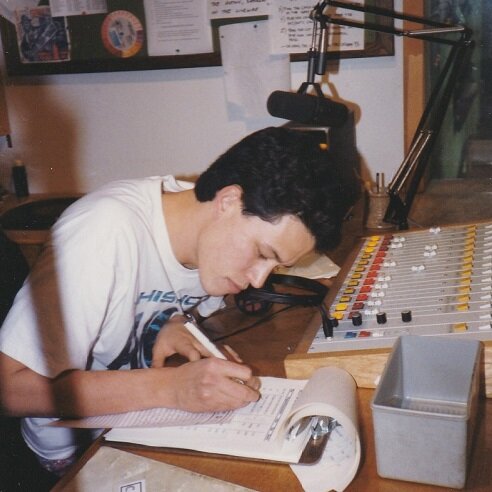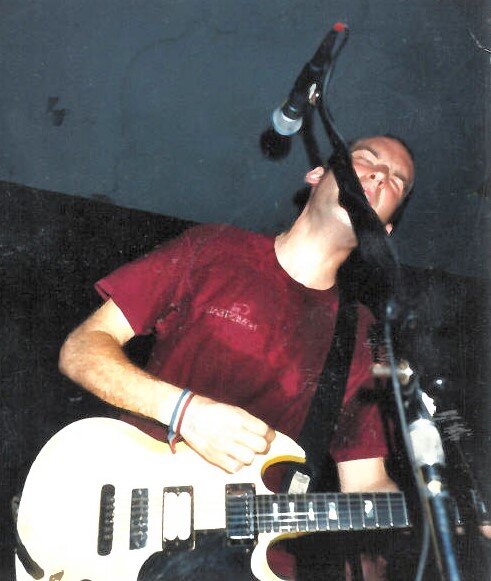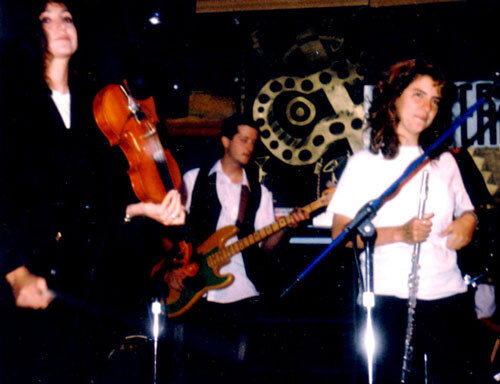Podcast Episode 3 - 1990
Transcription
Theme Song: Mike Nicolai, “Trying To Get It Right” [Bandcamp]
Welcome to Don't Call It Nothing, the podcast dedicated to the lost history of '90s roots, rap, and rock 'n' roll. I’m your host Lance Davis and today we dip our toe into the first year of the decade, 1990.
But first, I wanna give a big thank you to Mike Nicolai. He has graciously allowed me to use his song “Trying To Get It Right” as my intro and outro music. Mike’s a good friend, he is one of the best songwriters of the last 20-25 years, and he’s also the proprietor of Love Wheel Records, a brand spanking new record store in Austin. If you’re in the ATX, check it out. FYI, “Trying To Get It Right” comes from his 2018 LP, A Line Cook's Guide to New Satanic Empires, in my opinion, the single greatest encapsulation of life in Donald Trump’s America. Check it out on Bandcamp. That is not even hyperbole. It’s a badass F’ing record.
I also wanna give a shout out to Val in British Columbia. She joined the Don’t Call It Nothing family at the $5 membership level. International y’all! Looking at you Europe. Get on that. Really quickly, if you’d like to support independent musicology, head over to dontcallitnothing.squarespace.com or directly to buymeacoffee.com/pantsfucious. That’s me.
Now, before we get to 1990, I wanna dial it back a few months because the events of 1990 were set up by me making one of the smartest, most significant decisions of my young life in mid-August 1989, only a couple weeks after my 20th birthday. I joined the campus radio station, KCSC 95.5 FM (“The Livewire”). The actual day I signed up was funny because it was at registration. Now, I don’t even know how prevalent this is anymore. Like, I don’t even know if they have Registration Days. Maybe at smaller schools. Because nowadays you just register online, you can buy your books online, BOOP, you’re on campus.
But, back in those days you went to the gym, you signed up for your classes, and then when you were done they shuffled you out the back of the gym. That’s where you went through a parade of tables and booths set up for the Sierra Club, Kiwanis Club, this frat, that sorority, and smack dab in the middle of all this khaki and polo was a table playing obnoxious punk music, the mascot seemed to be some sort of giant lizard, and I’m pretty sure I remember Lori Campion turning a drunken cartwheel. It was obvious that every other table in this row leading out of the gym was doing their damnedest to ignore the misfit punks “ruining” a perfectly good afternoon. So, needless to say, I was home. These were my people.
I’d actually participated in a radio club at Golden West College (Huntington Beach) the year after high school. I graduated in ‘87. I spent a year in Huntington going to a local JC. It was down the street from me, Golden West College. That was the ‘87-’88 school year. That club consisted of DJs playing mixtapes over a PA. That doesn’t count (laughs). You drop your cassette in, you push play, there’s not much DJing involved. KCSC was the real deal. I spun records, read PSAs, played the promo carts, and because we broadcasted via cable, not over the airwaves, we weren’t governed by the FCC. Hellllooo, N.W.A. records.
The station’s library wasn’t massive, but it still had about 10,000 albums, give or take a couple hundred. And of those 10,000, I knew maybe 20. Lame. So, 10,000 was more than enough for me. I really made it incumbent upon myself to learn as much of this music as I could. My journey to rock ‘n’ roll sherpa began on those four-hour overnight shifts and sitting in Neil Tanner’s production room with a stack of records figuring out if I liked or didn’t like X (yes), Guadacanal Diary (no), Descendents (yes), Replacements (yes), The Church (no), Minutemen (yes), Mighty Lemon Drops (no), Dead Kennedys (yes), etc. etc.
My most vivid memory is actually discovering Hüsker Dü. Candy Apple Grey is not my favorite Hüskers album now, but my God, when “Sorry Somehow” came on, kicked (off) by that drum roll and that organ on top. Grant Hart’s yearning vocal – and his drumming, of course – it just won me over forever. Where had this band been all my life??? And then I put on Zen Arcade and it was like a ritual bloodletting. Have you ever been so mad that you felt like crying or just started crying? That’s Bob Mould on Zen, an album so raw and real it made me angry that I grew up in SoCal where the major “alternative” radio station in the ‘80s (KROQ 106.7 FM) privileged British bands like Depeche Mode and O.M.D. over killer American indie bands like the Hüskers and Replacements. You can go online and review “The KROQ Top 106.7 Songs of 1984,” the year of Zen Arcade, Double Nickels On The Dime by the Minutemen, and Let It Be by The Replacements. What was KROQ’s Top 10 for that year?
Frankie Goes to Hollywood - Relax
General Public - Tenderness
U2 - Pride (In the Name of Bono)
Bronski Beat - Why?
Prince - Erotic City
Frankie Goes to Hollywood - Two Tribes
Vandals - Ladykiller
Billy Idol - Rebel Yell
Echo & the Bunnymen - The Killing Moon
Thompson Twins - Hold Me Now
Come on. “Erotic City” is a jam, no argument there. I also like “Tenderness,” I’m not a monster. Hell, I’ll even throw in the Echo tune. It’s not “Bring On The Dancing Horses,” but in the interests of fairness, let’s keep it. So, that’s three keepers and seven mostly forgettable tunes in the Top 10. And the worst part is that of those ten, EIGHT are British. How can this happen in the second largest market in the US?!?! Can you blame me for growing up in SoCal and thinking that “new music” wasn’t worth my time?
At KCSC, I finally had context for punk rock and it was liberating. It wasn’t a haircut or a uniform or a simple fuck you – though the meta-commentary may still be fuck you. Punk rock was a process that was less about confrontation — though it was about confrontation — but it was more about expressing whatever’s inside of you as creatively as possible so your life is more than a connected series of transactions. Not that it wasn’t confrontational as I said, but sometimes the confrontation was internal, sometimes it was person to person, and yes, sometimes it was political or even abstract. And that’s just Fugazi I just described! Punk could also mean loud and fast and verging on metal, but it could also mean Celtic-inspired folk music. Both punk, neither sounding a damn thing like each other.
So NOW let us return to 1990 and a Chico venue known as The Burro Room. Formerly known as Hey Juan’s, The Burro Room was a building split down the middle. On one side was a Mexican restaurant with a small upstairs for smoking and drinking. On the other side was the band room, about 20 feet wide and maybe 50 feet from front to back, with high ceilings, a high stage, and a balcony somewhat similar to the one on the restaurant side. That stage was key because when bigger bands like Mudhoney, Thin White Rope, or The Flaming Lips played, The Burro Room was packed in tight, but because of the high stage, everyone had a view. There was also a small booth about 10 feet back and about 10 feet up from stage left, just big enough for someone to shoot video or I don’t know, maybe drunkenly do “The Humpty Dance.” I’m not mentioning any names, but his name definitely did not rhyme with Dance Lavis.
Fugazi Rises Reaching
If you visited the Don’t Call It Nothing Facebook page or website the past couple days you would’ve seen me waxing rhapsodic about May 24, 1990. That’s when Fugazi played a packed Burro Room. Repeater had been out for about a month and everyone at KCSC was chomping at the bit. We could not wait for this damn show to get here quick enough. And I feel like this was the show changed everything. Now, I’d previously seen Mudhoney and the Flaming Lips. Those were big boys in this world. But, I was such a newbie I didn’t fully appreciate their sets.
Later I saw the Angry Samoans, I saw Primus a couple times (maybe three times), I saw Nomeansno, Thin White Rope. About a month earlier I saw All down in Sacramento at the Cattle Club. Each of those shows was chipping away at this idea of rock music as something that had already peaked and we were settling for the rancid leftovers. Fugazi was an atomic bomb to the soft bigotry of market privilege, middle class conformity, and boomer/countercultural-centricity. This was my music. This was our music.
“Fugazi was an atomic bomb to the soft bigotry of market privilege, middle class conformity, and boomer/countercultural-centricity. This was my music. This was our music.”
Joe Lally’s bass swung the bottom end with authority — Come on, “Waiting Room?” — while Brendan Canty’s drums rode the groove on top, lots of accents, lots of fills, and emphatic punctuation. Meanwhile, Ian MacKaye and Guy Picciotto traded riffs, leads, and vocals on top of the rhythm section, though truth be told, Fugazi’s guitars are really an extension of the rhythm section more than a melodic counterpoint. Occasionally, not usually. I was standing second row and the guy in front of me got kicked in the face by a stage driver, blood flew out of his nose and MacKaye did that thing where he stopped the show and urged the audience to not hurt each other. That, of course, deepened the connection I felt with the band and my fellow audience members, for that matter. This was shared experience at its best.
Smells Like Scream Spirit
A few months later, I believe on September 20, 1990, a different punk band from Washington DC played The Burro Room. Featuring Peter Stahl on vocals, his brother Franz on guitar, a bong-rattling bassist and vocalist named Skeeter Thompson, and a manimal on drums named Dave Grohl, Scream didn’t just kick out the jams, they sucker punched them in the throat. Even if you’re not a huge punk or hardcore fan, Scream’s output from 1988-90 — when Grohl I’d say hit his peak in the band — is well worth checking out. You got No More Censorship in 1988. You got Fumble, which was released in ‘93, but recorded in ‘89. That features Grohl’s first lead vocal (“Gods Look Down“). And finally, you have the Your Choice Live Series, which I think it came out in ‘91, but documents a May 1990 show not much earlier than this Burro Room Show.
Scream was clearly influenced by Bad Brains, especially the Stahl boys, who owe an obvious debt to H.R. (Peter the singer) and Dr. Know (Franz the guitar player). Dave Grohl was like Earl Hudson by way of John Bonham. MASSIVE, massive drum sound. Just an awesome experience. Anyway, after the show, several of us partied with the band at Matt Brown’s apartment and all I remember is Skeeter hitting this three-foot, maybe four-foot bong like it owed him money. To this day, I’ve never seen a dude put marijuana in a chokehold like that. Oh my Lord, Skeeter. God help ya.
“Scream didn’t just kick out the jams, they sucker punched them in the throat.”
The Scream story then takes an interesting turn. As fate would have it, the band played SOMA in San Francisco the next night and in the audience were none other than Kurt Cobain and Chris Novoselic from Nirvana. They witnessed firsthand the wrecking crew that was Grohl. So, when Skeeter flew the coop on Scream a day or two later in LA, Grohl called his buddy, Buzz Osborne from The Melvins, and asked him, “Dude, do you know any bands who need a drummer?” As a matter of fact, he did. A few days later Grohl was in Seattle auditioning with the Nirvanas and on October 11, 1990, he played his first show with the band at the North Shore Surf Club in Olympia, WA. As I’m recording this, the post featuring Scream has gone live on the website and I include a link to that video. There’s a short clip of Grohl’s first gig. It’s pretty rad.
Here’s a fun fact: In the “Smells Like Teen Spirit” video, Grohl was wearing the same yellow Scream shirt with runes on the back that the band was selling at the Burro Room gig. Did I buy one? That would’ve been forward thinking on my part. So … no.
All the Money Spent Buying Your Consent
The last Burro Room show I’d like to highlight was not the product of the DC punk scene, though they did maintain a defiant left-wing perspective. The Bedlam Rovers were one of my favorite bands to play the Burro Room between 1989-92. I probably saw them a half dozen times either in Chico or on their San Francisco home turf because their Irish-inflected folk music hit home for me in a big way. I, for, sure saw them on November 2, 1990, but the show that sold me was a hot night, I’m almost positive it was in July. Yes, I had a massive crush on lead singer Caroleen Beatty (who didn’t?), but the band was dynamite. Their fast songs didn’t really sound like The Pogues, but they were invested with a similar raucous Celtic fury. DIY Pogues maybe? But, their slower songs, they were akin to the Waterboys’ Fisherman’s Blues, especially Cindy Wigginton's fiddle. Their record label (Heyday) had a sticker on the cover of their album, Frothing Green. It said, “Mekons meets Fairport Convention,” so there you go. Put that in your pipe and smoke it.
Take "No One's Illegal," for instance, a pro-immigrant waltz very much in the spirit of Woody Guthrie's "Deportee.” Guitarist and songwriter Marko Sakmann sings co-lead with Beatty, him low to her high, effectively mirroring the harmony of Kim Osterwalder's cello and Wigginton's fiddle. Meanwhile, Greg Snyder's bass nimbly walks through the arrangement, giving the song a wonderful forward momentum.
My favorite song is probably the opener "Objectivity," also written by Sakmann and also concerned with the manner in which the mainstream media essentially manufactures consensus. The chorus goes, "All the money spent creating your consent/All the money spent buying your consent." What’s that? You weren’t expecting Chomskian philosophical redress? Hi, I’m Lance, nice to meet you. “Objectivity” showcases Wigginton's mournful fiddle up high, but down in the meat of the arrangement you have Sakmann's electric guitar chopping it up with Jeremy Doyle’s mandolin, as brother Andrew Doyle’s drumming keeps you off-kilter.
And let's say you wanted to forget about lyrics for a few minutes and just dance around the room recklessly. "Three Drunken Maidens" would most certainly do the trick. I clearly remember this song roaring forth from The Burro Room stage on that sweltering July night and it was a sublime mix of heat, beer, crowd energy, and infectious, rambunctious anarchy. For a bunch of free-thinking, Bay Area leftists, the Rovers knew how to have fun.
You don’t have to be a drunken maiden to subscribe to this podcast, but let’s be honest. It probably doesn’t hurt [laughs]. Please go visit the Don’t Call It Nothing Facebook page and website. Dontcallitnothing.squarespace.com. Like, comment, become a member, tell yo mama, and tell a friend.
Talk to ya next time!






